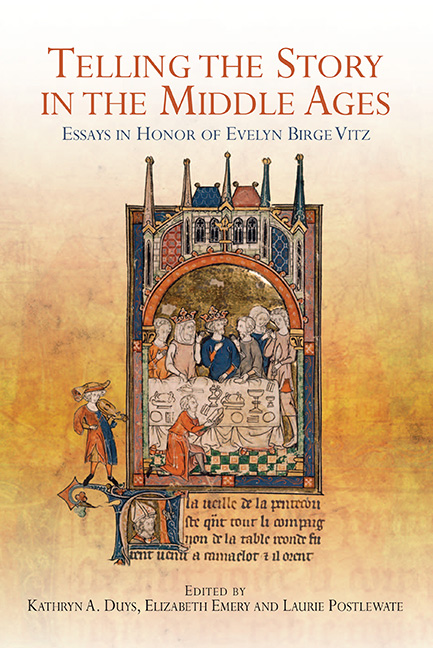Who Tells the Stories of Poetry? Villon and his Readers
Published online by Cambridge University Press: 17 June 2021
Summary
It has been my extraordinary good fortune to have been Timmie Vitz's partner in medieval studies throughout our entire career at New York University, starting in 1968. It was my privilege to follow her leadership in our many shared enterprises including the NYU College of Arts and Science Medieval and R enaissance Studies Program (where I served as Director after she stepped down in 1992), our ongoing Colloquium in Orality, Writing, and Culture (started in 1987), and our two-year series of workshops on Storytelling in Performance in history, law, literature, music and medicine (2004–06). Together, we worked with remarkable students, including the three editors of this volume, Kathryn Duys, Elizabeth Emery and Laurie Postlewate.
Villon and storytelling have been constants in the wonderful collegiality we have shared. Timmie led the way with her landmark book, The Crossroad of Intentions; my last course was the exciting Villon seminar we co-taught in 2009. I offer Timmie one more round of Villon and storytelling with deep affection and appreciation.
Voice is central to poetry: it establishes tone, style, theme and often genre through a poetic speaker, who may not necessarily have a particular social identity and who may tell stories but not necessarily have a story. Story, in contrast, requires characterization and action. Story clothes speakers in a social garb and engages them in encounters and conflicts. In story, features of a speaker's voice become an attribute of character.
Medieval authors and readers were fascinated by the relation between poetry and stories. From the thirteenth century on, lyrics were often compiled in narrative settings: songs were inserted into romances; short biographical fictions were invented to account for troubadour songs; Dante, Froissart and Machaut wrote first-person stories to frame out their own lyrics. Villon, however, did not create a narrative setting for the nineteen ballades and rondeaux he set into his Testament, a discursive poem or dit of 186 huitains (eight-line stanzas) dated to 1461. Moreover, unlike Dante's Vita Nuova or Machaut's Livre du Voir Dit, Villon's framing poem makes no attempt to account for the composition or form of the inserted lyric pieces. They are simply ‘there’ as lines that continue the speaker's thoughts or as objects that he ‘gives’ in this mock will, such as Villon's ballades for his mother (ll. 873–909), for his cruel lady love (ll. 942–69), or for Grosse Margot in her whorehouse (ll. 1591–627).
- Type
- Chapter
- Information
- Telling the Story in the Middle AgesEssays in Honor of Evelyn Birge Vitz, pp. 61 - 74Publisher: Boydell & BrewerPrint publication year: 2015



